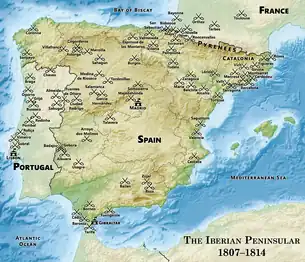| Battle of Alcolea Bridge | |||||||
|---|---|---|---|---|---|---|---|
| Part of the Peninsular War | |||||||
 Battle of Alcolea Bridge (Spain) | |||||||
| |||||||
| Belligerents | |||||||
|
|
| ||||||
| Commanders and leaders | |||||||
| Pierre Dupont | Pedro Echávarri | ||||||
| Strength | |||||||
| 18,000 | 3,000 | ||||||
| Casualties and losses | |||||||
| Unknown | Unknown | ||||||
The Battle of Alcolea Bridge was a minor battle that took place on 7 June 1808, during the Peninsular War, at Alcolea, a small village 10 km from Córdoba, the city that would be invaded by French troops later that same afternoon.[1]
Background
The Dos de Mayo Uprising had put Iberia in revolt against French rule.
Battle
It is significant in that it was the first staged battle against regular Spanish troops that General Pierre Dupont de l'Étang fought in Andalusia after having left Toledo on 24 May, heading for Cádiz, with 18,000 troops. Although successive movements of French troops would be harried by Spanish guerrilleros fighting along the way, on both sides of the Sierra Morena and in the steep gorge (defile) of Despeñaperros that separates Castile-La Mancha (including Madrid) and Andalusia, Dupont met with no resistance there.
At Alcolea, some 3,000 regular troops, accompanied by some armed civilians, tried, unsuccessfully, to stop Dupont's vastly superior forces at the bridge over the Guadalquivir and were forced to retreat to Córdoba. Dupont went on to capture Córdoba that same day, his troops ransacking the city over four days.
The seventy troops Dupont had left to protect the bridge were later massacred by guerrillas led by Juan de la Torre, the mayor of the town of Montoro.[2]
One of the Spanish soldiers who fought at Alcolea was Pedro Agustín Girón, who would later become a minister of war, and who would also accuse General Echávarri of not having personally participated.[3]
Aftermath
Iberia in revolt proceeded with the Capture of the Rosily Squadron.
See also
Notes
- ↑ Foy 1827, pp. 218–220.
- ↑ Esdaile 2003, pp. 253–254.
- ↑ Esdaile 2003, p. 66.
References
- Foy, Maximilien Sébastien (1827). History of the war in the Peninsula under Napoleon, to which is prefixed a view of the political and military state of the four belligerent powers. countess Foy. pp. 218–220. Retrieved 4 May 2021.
- Esdaile, Charles (2003). The Peninsular War: A New History. Palgrave Macmillan. ISBN 978-1-4039-6231-7. Retrieved 4 May 2021.
External links
- Baste, Pierre (1824). "Recollections of capitaine de fregate Pierre Baste". Retrieved 4 May 2021. Commander in the Marins de la Garde Imperiale
 Media related to Battle of Alcolea Bridge at Wikimedia Commons
Media related to Battle of Alcolea Bridge at Wikimedia Commons